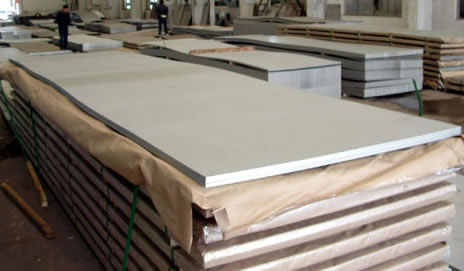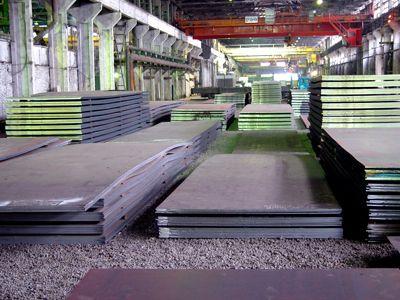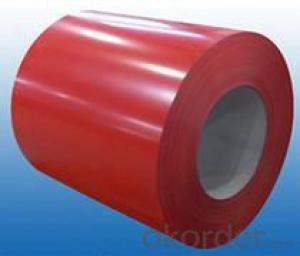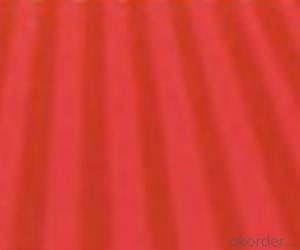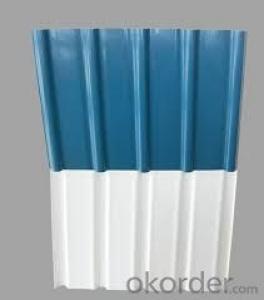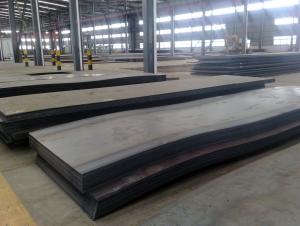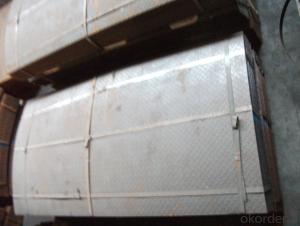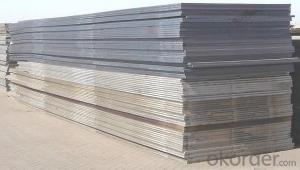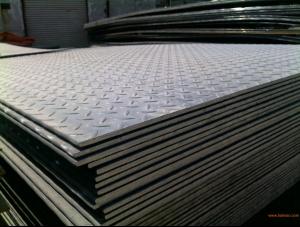Hot rolled sheet steel
- Loading Port:
- China Main Port
- Payment Terms:
- TT OR LC
- Min Order Qty:
- -
- Supply Capability:
- -
OKorder Service Pledge
OKorder Financial Service
You Might Also Like
In thick plate is 4.5 25.0 mm thickness steel plate,
In the thick plate
In the thick plate
Thickness is 25.0 100.0 mm thick plate, thickness more than 100.0 mm thick plate.
In thick plate is mainly used in construction, machinery manufacturing, container manufacturing, shipbuilding, bridge construction, etc. Also can be used to make all kinds of containers, furnace shell, furnace plates, bridge and vehicle static steel plate, low alloy steel plate, shipbuilding steel plate, boiler plate, pressure vessel steel plate, plate, automobile beam steel plate, some parts and welding tractor components, etc. Through the thick plate USES: widely used in the manufacture of containers, furnace shell, furnace plates, bridge and vehicle static steel, low alloy steel plate, steel Bridges with steel plate, made of steel plate, boiler plate, pressure vessel steel plate, plate, automobile beam steel plate, some parts and welding tractor component specific application.
bridge
Steel plate for large railway Bridges, requirements under dynamic load, shock, vibration, corrosion, etc., such as: Q
Pressure vessel plates
Pressure vessel plates
235 q, Q345q, etc.
shipbuilding
Used in the manufacture of Marine and inland ship hull, require high strength, plasticity, toughness and the cold bending property, welding performance, corrosion resistant performance is good. Such as: A32, D32, A36, D36, etc.
Boiler plate, boiler plate: used in the manufacture of all kinds of boiler and important attachment, because the boiler plate in medium temperature (below 350 ° C) work under the high pressure condition, except under high pressure and impact, fatigue load and water and gas corrosion, and the requirements to ensure certain strength, but also has good welding and the cold bending property, such as: Q245R, etc.
The pressure vessel
Mainly used in the manufacture of petroleum, chemical separation and gas storage and transportation of pressure vessels and other similar devices, general work pressure at atmospheric pressure to 320 kg/cm2 to 630 kg/cm2, even in - 20-450 ° C temperature within the scope of work, for the container plate except a certain strength and good plasticity and toughness, must also have good cold bending and welding performance, such as: Q245R, 15 crmor Q345R, 14 cr1mor, etc.
Car girder
Girders making cars (longitudinal beam, beam), the thickness of 2.5 12.0 mm low alloy hot rolled steel plate. Due to the complexity of automobile beam shape, besides demanding strength and cold bending performance, also requires stamping performance is good.
- Q: Can steel sheets be used for making shipping containers?
- Steel sheets are indeed suitable for the construction of shipping containers. In reality, steel is the preferred material for building shipping containers because of its robustness, durability, and ability to withstand diverse weather conditions and environmental elements. Typically, steel sheets are cut, bent, and welded together to create the walls, roof, and floor of the container. This construction technique guarantees the container's strength and ability to endure the challenges of transportation, such as stacking, lifting, and exposure to harsh marine environments. Moreover, steel containers can be easily tailored and adjusted to fulfill specific requirements for storing and transporting cargo.
- Q: What are the different storage methods for steel sheets?
- Steel sheets can be stored in various ways, depending on specific requirements and available space. Here are some commonly used storage methods: 1. For small quantities or lighter sheets, a basic method is flat storage, where sheets are placed horizontally on a flat surface like the floor or metal racks. 2. Vertical storage is another option, which involves placing sheets against a wall or using specially designed vertical racks. This not only saves floor space but also allows for easy access and identification of different sheet sizes. 3. To store long and heavy sheets, cantilever racks with horizontal arms extending from a vertical column provide excellent support. These racks facilitate easy loading and unloading using forklifts or cranes. 4. Roll-out racks, equipped with rollers or ball bearings, work like drawers, allowing steel sheets to be easily rolled in and out. This method is ideal when frequent access to different sheets is required, as it offers good visibility and convenient retrieval. 5. A-frame racks, featuring angled arms resembling the letter "A," are suitable for storing large quantities of steel sheets. This method provides easy access while ensuring organization. 6. For maximum storage capacity and efficiency, automated storage and retrieval systems (AS/RS) come into play. These computer-controlled systems can be designed as vertical lift modules or robotic systems, automatically storing and retrieving steel sheets. When choosing a storage method, it's crucial to consider factors such as sheet size, weight, accessibility, and safety. Additionally, adequate measures should be taken to protect the sheets from moisture, dust, and other environmental factors that could potentially impact their quality.
- Q: Can steel sheets be used for furniture manufacturing?
- Certainly, furniture manufacturing can utilize steel sheets. Steel, being a versatile and durable material, lends itself well to shaping and forming into various furniture components, including table legs, frames, and shelves. The strength, stability, and sleek appearance of steel sheets make them a commonly chosen option for producing modern and industrial-style furniture. Moreover, steel offers easy customization through welding, bending, or cutting, enabling the creation of personalized furniture designs. By incorporating steel sheets, furniture manufacturers gain advantages such as resistance to corrosion, fire, and pests. Consequently, steel sheets have become a favored choice among furniture manufacturers aiming to craft contemporary, sturdy, and enduring furniture pieces.
- Q: Can steel sheets be used for cladding or facades?
- Yes, steel sheets can be used for cladding or facades. Steel is a durable and versatile material that can provide strength, weather resistance, and aesthetic appeal to buildings. It can be shaped and customized to create different designs, textures, and finishes, making it a popular choice for cladding or facades in modern architecture.
- Q: Are steel sheets suitable for automotive chassis?
- Automotive chassis can indeed be made using steel sheets. Steel is a favored option for constructing automotive chassis because of its robustness, durability, and affordability. It provides exceptional structural integrity and can endure the various forces and strains encountered by a vehicle during operation. Steel sheets also possess commendable resistance against impacts, vibrations, and corrosion, which renders them highly suitable for utilization in automotive chassis. Furthermore, steel is a readily accessible material that can be easily shaped, welded, and molded into diverse forms and sizes, thus allowing for flexibility in design and manufacturing procedures. In summary, steel sheets are a trustworthy and extensively employed material in the automotive sector when it comes to fabricating chassis that fulfill the necessary safety, performance, and longevity criteria.
- Q: Can steel sheets be used for automotive suspension components?
- Yes, steel sheets can be used for automotive suspension components. Steel is a common material used in automotive manufacturing due to its strength, durability, and cost-effectiveness. Steel sheets can be shaped and formed into various suspension components such as control arms, coil springs, and stabilizer bars, providing the necessary support and stability required for a vehicle's suspension system.
- Q: What is the acoustic insulation performance of steel sheets?
- The acoustic insulation performance of steel sheets is generally low. Steel is a dense and rigid material that does not provide much soundproofing or noise reduction. However, the acoustic insulation can be improved by using specialized techniques such as adding layers of acoustic insulation materials or incorporating sound-absorbing panels in the construction.
- Q: How are steel sheets protected during welding?
- Steel sheets are protected during welding through a process called shielding. Shielding is essential to prevent the steel sheets from being exposed to oxygen and other atmospheric contaminants that can cause oxidation and impurities in the weld. There are various methods used to shield the steel sheets during welding. One common method is to use a shielding gas, such as argon or carbon dioxide, which is directed at the welding area to create a protective atmosphere. This gas displaces the surrounding oxygen, preventing it from reacting with the heated metal and causing oxidation. In addition to shielding gas, another method commonly employed is the use of flux. Flux is a substance that is applied to the joint area of the steel sheets prior to welding. It acts as a protective barrier, creating a molten slag that covers the weld and shields it from the atmosphere. Flux can be in the form of a powder, paste, or even a wire that is fed continuously during welding. Furthermore, some welding techniques, such as submerged arc welding, utilize a combination of both shielding gas and flux to provide optimal protection to the steel sheets. This technique involves the use of a granular flux that is fed continuously along with the welding wire. The flux melts and forms a protective layer over the weld, while the shielding gas prevents atmospheric contamination. Overall, the protection of steel sheets during welding is vital to ensure the quality and integrity of the weld. Shielding methods, such as shielding gas and flux, create a protective environment that prevents oxidation, impurities, and other defects from forming in the weld, resulting in a strong and durable joint between the steel sheets.
- Q: How do steel sheets compare to wood sheets?
- Steel sheets and wood sheets have distinct differences in terms of strength, durability, and use cases. Firstly, steel sheets are known for their exceptional strength and durability. They can withstand heavy loads, extreme weather conditions, and are highly resistant to warping, rotting, and insect damage. Wood sheets, on the other hand, are less robust and can be vulnerable to moisture, termites, and decay if not properly treated or maintained. In terms of versatility, steel sheets offer a wide range of applications. They are commonly used in construction, automotive, and manufacturing industries due to their high tensile strength and structural stability. Wood sheets, on the other hand, are often used in interior design, furniture making, and smaller-scale construction projects due to their natural aesthetic appeal and ease of manipulation. Additionally, steel sheets are fire-resistant, making them a safer option compared to wood sheets, which are combustible and can contribute to the spread of fire. Steel sheets also have a longer lifespan, requiring less maintenance and replacement compared to wood sheets, which may need regular refinishing, sealing, or replacement due to wear and tear. However, wood sheets have their advantages as well. They are typically more cost-effective than steel sheets, making them a popular choice for budget-conscious projects. Wood sheets also have better insulation properties, providing natural warmth and soundproofing qualities. Ultimately, the choice between steel sheets and wood sheets depends on the specific requirements of the project, including factors such as budget, desired aesthetics, structural needs, and environmental considerations.
- Q: Can steel sheets be used in aerospace applications?
- Yes, steel sheets can be used in aerospace applications. While steel is not as commonly used as other materials like aluminum or titanium in aerospace, it can still be employed in certain specific applications such as structural components or engine parts where its high strength, durability, and resistance to extreme temperatures are beneficial.
Send your message to us
Hot rolled sheet steel
- Loading Port:
- China Main Port
- Payment Terms:
- TT OR LC
- Min Order Qty:
- -
- Supply Capability:
- -
OKorder Service Pledge
OKorder Financial Service
Similar products
Hot products
Hot Searches
Related keywords



